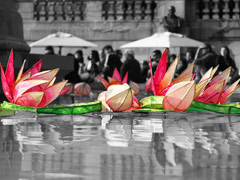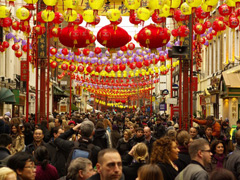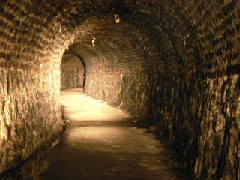


Diwali
Diwali is also known as the Festival of Lights, as during the five days this celebration lasts homes and shops put up oil lamps as decoration. The date varies each year, and falls between mid-October and mid-November, as it’s celebrated according to the Hindu calendar. According to Hindu tradition the lamps are lit to help the goddess of wealth find her way home, but they also symbolise the triumph of light over darkness. Every year there is a big celebration on Trafalgar Square which is attended by thousands of people, with dancing and live music. Numerous restaurants have Diwali celebrations with special set meals, such as Dishoom, La Porte Des Indes and Cinnamon Kitchen, and there are more oddball options, like the Diwaloween, combined Halloween and Diwali party that took place at the Cape Bar in 2012.
Russian Old New Year
Although New Year in Russia is celebrated on January 1st, like in Western countries, the Orthodox New Year takes place on January 14th. It’s referred to as the ‘Old New Year’ as it dates back to the time when the Gregorian calendar was in use, which is 13 days ahead of the Western calendar. It hasn’t been an official bank holiday in Russia since 1917, but there are still a fair few who observe this date. As usual, Trafalgar Square was the setting for the London festivities, which included puppet theatre, folk dancing, performances by Russian pop singers and food, however these stopped after 2008.
\n\nChinese New Year
The Chinese New Year parade in London has to be the most colourful event of its kind, with the exception of Notting Hill Carnival. A procession of floats marches from Trafalgar Square to Soho, (passing through Chinatown naturally), featuring numerous Chinese dragons. There are also food stalls and performances from dancers. Known as the spring festival in China, it is celebrated according to the lunar calendar and lasts a fortnight, starting sometime between the end of January and the middle of February. The final day is when the lantern festival is celebrated, although in the UK this sometimes takes place on the first day. Mooncake is eaten, pastries made with pork lard and filled with sugary pastes or savoury fillings like eggs. They may be unhealthy, but they’re delicious, and are sold at most of the supermarkets in Chinatown at this time of year. In terms of feasting, check out our favourite Chinese restaurants here.
Baishaki Mela
The Bengali New Year has been celebrated on Brick Lane since 1997, with a festival called ‘Baishaki Mela’. There was controversy in 2012 when Tower Hamlets council cut ties with the festival amid allegations of smuggling illegal immigrants, but despite this the show went on. This is the second biggest annual street festival in London after the Notting Hill Carnival, with up to half a million people turning up for the music (both traditional and contemporary), funfair, art and theatre workshops for children, the procession through Shoreditch and the food stalls. The date varies each year as it depends on the Bengali calendar, but it’s usually in May. \n\nNorouz
Iranian New Year, called ‘Norouz’, coincides with the start of spring, and this also varies in time and date each year. In Iran this is the equivalent of Christmas Day, and is usually spent at home with family. A feast is prepared for the moment precise moment of the spring equinox, whether this is at 2 in the morning or at midday, and typical foods include a thick noodle soup, fish with rice and herbs, herb omelette, and various sweets like baklava. The tradition is to set the table with different foods and items beginning with the letter ‘s’ in Iranian, this includes apples, somac berries, vinegar, and wheat, which is planted in a pot days prior to the celebration so that the green plants grow. Another, quirkier tradition is to place an orange in a bowl of water, representing the earth in space, as superstitious minds believe the orange moves at the time of the equinox. In 2011 the British Museum held a Norouz weekend, with Iranian music, sufi dancing and film screenings, and in 2012 the V&A held a similar do, so it’s worth checking their websites for future events.
Western New Year
Each year there is a build-up of anticipation in the run-up to New Year’s Eve, when people start asking friends what their plans are at the start of December. The cost of tickets for events and dining out become over-inflated and even entry to your local pub can set you back £40. The main event, which is free, is the fireworks display on the South Bank, which starts at a quarter to midnight, with the chimes of the Big Ben in the background. On New Year’s Day there is a parade through central London, featuring Pearly Kings and Queens and thousands of performers representing countries from all over the world.


